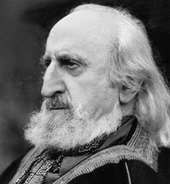Frithjof Schuon
filósofo suizo
| Frithjof Schuon | |||||||||||
|---|---|---|---|---|---|---|---|---|---|---|---|
 |
|||||||||||
| Véase también | |||||||||||
| Esta página contiene citas de una persona fallecida hace 26 años. | |||||||||||
| Dependiendo de cómo se publicaran, pueden estar protegidas por derechos de autor. Deben usarse según las políticas de licencias de Wikiquote. | |||||||||||
Frithjof Schuon (Basilea, 18 de junio de 1907 – Bloomington, EE.UU. 5 de mayo de 1998) fue un filósofo místico suizo.
Citas
editar- «Cuando una persona se encuentra frente a una catedral [medieval], realmente se siente en el centro del mundo; ahí de pie ante una iglesia renacentista, barroca o rococó, simplemente se siente en Europa».
[When standing before a [medieval] cathedral, a person really feels he placed at the center of the world; standing before a church of the Renaissance, Baroque, or Rococo periods, he merely feels himself to be in Europe].[1]
- «En el catolicismo me encantaba la manifestación litúrgica de lo sagrado, la belleza de la misa en las iglesias de estilo gótico, el culto a la Santísima Virgen y el rosario; pero no me podía quedar solo con esto, porque ya había leído el "Bhagavad Gita" y había experimentado profundamente el arte sagrado del Lejano Oriente».
[In Catholicism I loved the liturgical manifestation of the sacred, the beauty of the Mass in the Gothic-style churches, the worship of the Blessed Virgin and the rosary; but I cold not stop with this, for I had early read the Bhagavad Gita and profoundly experienced the sacred art of the Far East».[2]
- «La naturaleza salvaje es una con la santa pobreza y también con la infantilidad espiritual; es un libro abierto que contiene una inagotable enseñanza de la verdad y la belleza. Es en medio de sus propios artificios donde el hombre más fácilmente se corrompe, son ellos los que lo vuelven codicioso e impío; cercano a la naturaleza virgen, que no conoce ni agitación ni falsedad, tenía la esperanza de permanecer contemplativo como la misma naturaleza».
[Wild Nature is at one with holy poverty and also with spiritual childlikeness; she is an open book containing an inexhaustible teaching of truth and beauty. It is in the midst of his own artifices that man most easily becomes corrupted, it is they who make him covetous and impious; close to virgin Nature, who knows neither agitation nor falsehood, he had the hope of remaining contemplative like Nature herself].[3]
- «Si tu objetivo es salvar a la humanidad, primero debes saber lo que significa ser un hombre; Si deseas defender el espíritu, debes saber qué es el espíritu».
[If one's aim is to save mankind, one must first know what it means to be a man; if one wishes to defend the spirit, one must know what is spirit].[4]
Sobre el autor
editar- «No me he encontrado con un trabajo más impresionante en el estudio comparativo de la religión oriental y occidental».
[I have met with no more impressive work in the comparative study of Oriental and Occidental religion].[5]
Referencias
editar- ↑ Transcendet Unity of Religions, "Concerning Forms in Art" Oldmeadow, p.15
- ↑ Frithjof Schuon: Messenger of the Perennial Philosophy Oldmeadow
- ↑ Light on the Ancient Worlds (1965) "The Shamanism of the Red Indians"Oldmeadow, p.8
- ↑ «Tradition and Modernity». Sacred Web - A journal of tradition and modernity.
- ↑ Eliott, en referencia a The Trascendent Unity of Religions (1953): Lings, Clinton, Martin, Minnaar, editores (2007). World Wisdom, Inc, ed. The Underlying Religion: An Introduction to the Perennial Philosophy. ISBN 9781933316437.
Bibliografía
editar- Oldmeadow, Harry (2010). World Wisdom, Inc, ed. Frithjof Schuon and the Perennial Philosophy. ISBN 9781935493099.
